
Biogas Nord is an engineering firm
that has specialized in the development, planning, construction and
operation of biogas plants since the mid-1990s and has the capability
to build up to 60 plants a year.
Biogas Nord
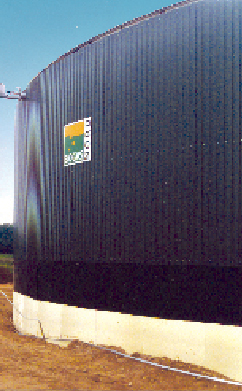 |
Biogas Nord is an engineering firm that has specialized in the development, planning, construction and operation of biogas plants since the mid-1990s and has the capability to build up to 60 plants a year.
On the basis of comprehensive analysis of individual requirements, Biogas Nord builds compact and efficient gas generation plants from tried and tested components, which will contribute towards environmental protection while also boosting the farm operator’s earnings, the company says.
The company’s biogas plants are based on the flow-storage process. This involves the operation of several tanks (fermenters) with substrate continuously flowing through them. The addition of substrate into the fermenter (first tank) raises the level of the sludge and the putrefied sludge flows through the overflow into the next tank. This process is repeated if there is another tank connected to the second tank.
The tanks the company builds are upright, cylindrical and made of reinforced concrete. All tanks can be fitted with up to four mixing devices depending on the type and amount of substrate to be treated and the size of the tank. Fermenters and secondary fermenters are fitted with double-membrane roofs for gas storage. The inner membrane serves as a gas holder and the outer membrane as protection against the weather.
After purification, the biogas is converted into electrical and thermal energy in a combined heat and power plant. Some of the electrical energy is used to cover the electricity requirements of the biogas plant. Most of it is fed into the public grid.
www.biogas-nord.de
Environmental Power/Microgy
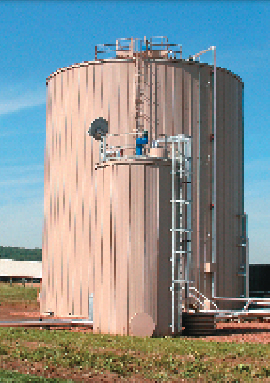 |
Microgy is a developer, owner and operator of renewable gas facilities. The company uses advanced anaerobic digestion technology to extract methane-rich biogas from animal and food industry waste. Microgy produces energy that is cost-effective, clean, reliable and secure, and helps farms and businesses manage the wastes they generate. The company is said to make it easy for clients by providing a complete turnkey solution, including development, construction, financing and ongoing operation and maintenance, allowing farm operators to focus on their own priorities.
Microgy holds the exclusive North American license to a proprietary European anaerobic digestion technology that has been shown to generate significantly more biogas than other digestion methods, the company says. This technology is in operation at facilities in the United States, and has been well proven over the past 15 years in more than 20 facilities in Europe.
Microgy systems are outfitted with sophisticated monitoring and control devices, allowing the company to carefully monitor and manage the systems. The company’s operations team can view the inner workings of each project on a real-time basis, either on-site or remotely, and make adjustments as necessary.
www.environmentalpower.com
Schick Enterprises
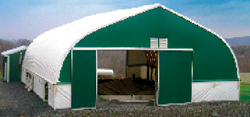 |
Schick Enterprises, the creator and manufacturer of innovative farm technologies such as SortAll Revolution and Automatic Gestation System (AGS), has developed a manure digester that is said to be ideal for odor reduction and power generation.
The digester can convert livestock manure, including swine manure, into biogas which can then power a generator or other machinery. A pit pump has been incorporated into the design for added efficiency. In this unique design, the building housing the livestock also acts as a collection and storage space for manure, so that no additional post-digestion manure storage is needed. One customer integrated Schick’s digester into a 2,200-head swine barn and now has the ability to power up to 1,100 kilowatts a day.
www.schickenterprises.com
GHD Inc
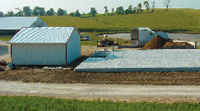 |
GHD, Inc has been a leader in the environmental industry for the past 18 years, specializing in petroleum and farm-related environmental engineering. Located in Chilton, Wisconsin, GHD has successfully designed and installed its patented two-stage mixed plug-flow digester system across the United States. GHD anaerobic digesters are said to be cost-effective and require low maintenance. Byproducts from the digester system include: significant odor reduction; a biogas that can be harnessed to create electricity, natural gas or methanol; a bio-solid that is utilized as high-quality bedding in dairy operations and also as a soil amendment; heat, in the form of hot water, that farmers use to heat various aspects of their operation, such as maintenance shops and parlors; and a primarily inorganic liquid that can be applied directly to a growing crop, greatly enhancing crop yields and reducing the likelihood of run-off, according to the company.
GHD, Inc began research and development on its anaerobic digester system in 1999. In September, 2001, GHD installed its first digester at Gordondale Farms in Nelsonville, Wisconsin. Since then, GHD has installed its system at seven additional Wisconsin farms, as well as 14 other dairy farms located in Indiana, Vermont, Georgia, Michigan, Illinois, and Washington. Collectively, these 22 operations process the manure from approximately 56,000 cows through GHD’s anaerobic digesters.
www.ghdinc.net
Biogas Direct
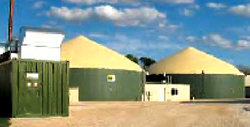
|
Biogas Direct is committed to providing North American livestock producers and agricultural operations with a simple, low maintenance biogas system to meet their waste management, gas and electrical generation needs. Biogas Direct utilizes the expertise and engineering of Biogas Nord and SEVA ENERGIE AG—two of Germany’s leading names in biogas technology.
Biogas Nord is one of the oldest and most respected names in livestock and energy crop anaerobic digestion systems, with more than 150 working systems throughout the world. SEVA ENERGIE AG offers a full line of electrical generation equipment for biogas and other biofuels.
Biogas Direct digesters meet an industrial standard but are applicable for production agriculture. The company’s farm line anaerobic digestion systems emphasize simplicity and efficiency. The system is a complete mix/mesophilic technology, combined with a solid concrete tank design and as little as one working pump. The detachable roofing system allows for easy cleaning and inspection of the interior of the tanks, one of the deciding factors for the system’s selection by Michigan State University on Green Meadow Farms, Elsie, Michigan.
As an anaerobic digestion system designer, engineering, and construction provider, Biogas Direct offers a full line of products and services to facilitate customer needs. These services include feasibility study analysis, site design and engineering, system construction, and personal assistance with system start-up and operations.
www.biogas-direct.com
QuestAir
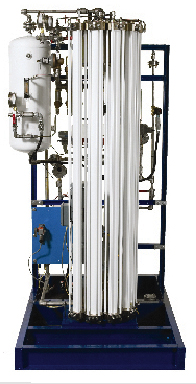 |
There are a number of ways farmers can profitably exploit methane-containing biogas produced by the anaerobic digestion of manure and other organic wastes. One method is to purify the biogas to high-purity methane (natural gas) for sale to the local natural gas utility, or to replace purchased natural gas.
QuestAir Technologies develops and manufactures systems that purify biogas streams—such as digester gas and landfill gas—to natural gas grade methane. QuestAir’s optimized pressure swing adsorption (PSA) process delivers high efficiency in a compact, reliable and cost effective package.
QuestAir recently installed one of its M-3200 PSA systems to upgrade biogas from a digester installed at the Scenic View Dairy in Michigan (see the story on QuestAir’s recent installation at the dairy farm on page 34 in this issue of Manure Manager). QuestAir has also installed PSA systems to upgrade methane from landfill gas at landfills in the US and in Canada.
www.questairinc.com
Clear-Green
 |
Clear-Green provides solutions to industries with organic waste streams through processing services and byproduct marketing. The company is focused on developing projects that apply advanced biotechnology and separation processes to provide environmentally friendly, cost-effective waste management alternatives designed to meet the specific needs of clients. Clear-Green has a diverse portfolio of available technologies and processes applicable to various types of organic waste.
While most people view organic waste as a problem, Clear-Green sees it as an opportunity to extract more value. Every ton of organic waste has significant energy potential that usually goes unused. Biogas and fertilizer nutrients can be extracted from organic waste and have an exciting future as “value-added” products, according to the company.
While most alternative energy/waste processing/manure management companies promote a “be-all/end-all” solution to waste challenges, Clear-Green’s experience has shown that it is very difficult to fit one technology into all situations. The dynamics of each site change so much that what looks to be a possible technology option in one waste producer’s operation may not be a solution to a seemingly identical producer in another region.
Clear-Green prefers to work with a number of technology solution providers. The company feels that by structuring its business model in this way, it is able to provide the “optimal” solutions for clients.
Energy Unlimited
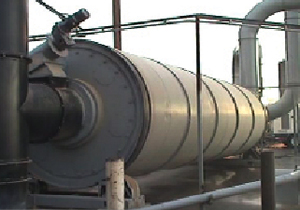 |
Energy Unlimited Inc has taken its 20 years of drying experience and applied it to the challenges of manure management. The company’s drying system can dry 70 percent moisture manure down to a usable zero to 40 percent, depending on a farm’s particular needs. Whether the farm beds with sand or wood shavings, uses a flush or drag system, Energy Unlimited can dry the waste.
The company’s equipment can separate sand from the manure and use the dry matter for fuel in the burner, while giving the farm back its good sand bedding.
Energy Unlimited provides many services to help in drying systems. The company can provide consulting, whole plant layout and design, starters, PLC whole plant automation including burner control, fabrication of cyclones, conveyors, hoppers, diverters, chutes, structural frame work and anything else that might be required during installation.
Energy Unlimited can install an entire plant from the ground up or help choose what parts the company can do and what parts the customer can do themselves to help keep costs down.
Energy Unlimited has done work for companies that are drying alfalfa, wood shavings, wood pellets, PVC resin, bakery waste, seed corn, and shrimp heads.
www.energyunlimitedinc.com
RCM Biothane
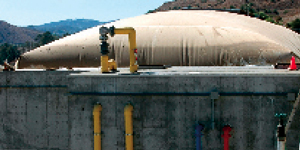 |
RCM Digesters merged with New Jersey-based Biothane Corporation in 2006 to become RCM Biothane, LLC. Biothane’s extensive experience with industrial anaerobic wastewater digestion and large-scale design/build projects perfectly complement RCM’s experience with anaerobic farm and mixed waste digestion, the companies say.
RCM Biothane designs and builds anaerobic digester systems and supplies specialty equipment, employing proprietary technology and know-how. The technology has been tested and proven over the last 20 years. According to the company, RCM is the national market leader in livestock waste anaerobic digestion technology.
RCM designs four different types of digesters because of the differences between farms. The company develops the right digester in a cost efficient configuration for each project by conducting pre-design studies on the farm. RCM designs the system and selects and supplies the equipment. The company has OEM relationships with suppliers to control price and quality.
Its products and services include:
• anaerobic digestion feasibility studies – system layout, costs
and benefits;
• complete anaerobic digester design, construction
management, start-up and troubleshooting;
• power market development;
• byproduct market development and;
• regulatory compliance and expert witness services.
www.rcmdigesters.com
Onsite Power/Propane Education & Research Council
This past fall, the Propane Education & Research Council (PERC) joined the University of California Davis (UC Davis), Onsite Power Systems, Inc, and industry partners at the official start-up of the anaerobic biodigester system for UC Davis’ Biogas Energy project. The project will demonstrate an innovative waste-to-energy technology with possible environmental and economic advantages, including potential as a renewable energy source.
The Biogas Energy project, the idea of UC Davis professor Ruihong Zhang and students in the biological and agricultural engineering department, is the result of eight years of university lab tests and engineering by Onsite Power Systems.
Biodigesters often need supplemental power for start-up, shutdown, and other purposes to ensure uninterrupted operation. To meet this need, PERC contributed to the purchase of two propane-fueled boilers; a low-emission, California Air Resources Board-certified propane engine; and a generator for the project.
Anaerobic biodigesters use bacteria to break down manure and convert it to biogas, a form of methane. The UC Davis/Onsite Power Systems biodigester also produces raw hydrogen in its two-step process. The hydrogen can be marketed as a fuel source for use in fuel cells or motor vehicles and sold as an industrial product. The biodigester can produce an estimated 22 therms of high-quality biohydrogen and biogas from one ton of waste.
www.agpropane.com.
Environmental Products & Technologies
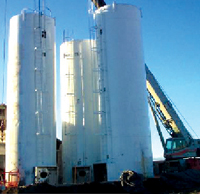
|
Environmental Products & Technologies Corporation employs a high rate anaerobic digester as a component of its closed-loop organics management system. The induced blanket reactor (IBR) operates as a mesophillic, complete mixed digester and is designed to create a super rich concentration of digesting bacteria that improves the performance of the IBR. The influent is preheated and the pH adjusted prior to being introduced into the digester, thus eliminating any problems with internal heating elements.
The significant technical benefit of the IBR is a short hydraulic retention time of six days on animal manure. This allows for decreased storage requirements. The system has a smaller footprint and is modular in design. Effluent from the digester is sent to a separator, and the solids are then delivered to the EPTC patented aerobic bioreactor. The bioreactor is a continuous process cycle which produces a pasteurized, odor-free, weed seed-free, nutrient rich material that can be used as bedding or employed or sold as a high quality soil amendment. The throughput cycle is three days for dairy and hog manure.
Water from the separator is treated with a proprietary water treatment system for recycle/reuse in an eight-hour cycle. The system is designed with all the necessary instrumentation, sensors, and controls to provide remote asset management through an Internet connection.
www.eptcorp.com
Envirogain
Through Envirogain’s new FEOS process, farm operations can transform their manure and sludge coming from aerobic and anaerobic digesters into sources of income through the production of dry, concentrated, hygienized and deodorized fertilizer, heat and carbon credits (GHG abatement).
The FEOS technology is an integrated process of biodrying and drying which transforms 20 percent and more dry, rough biomass into dry, concentrated, hygienized and deodorized fertilizer. It has been developed by Envirogain in the context of GHG and fossil fuels abatement. It was also developed to meet the needs of the organic fertilizer market, which requires a dry product, without pathogenic organisms, that is deodorized, rich in nutrients and priced competitively.
The patent pending FEOS technology is the result of many years of R&D work done by the Envirogain team and its scientific partners such as the Research and Development Institute for the Agri-Environment (IRDA) and the École Polytechnique de Montréal (EPM). During R&D work and field activities, important discoveries on sludge agronomical reuse and energy recovery from biomass have been achieved.
These include key discoveries such as the potential of energy from thermophile aerobic composting digesters. The measurements done by Envirogain and its scientific partners demonstrate that this potential is close to 20,000 kJ per kg of used organic material. When the digesters are insulated and closed—and when conventional heat exchangers are used to recover energy from these digesters—it has been proven that the FEOS technology allows a reduction of 85 percent in the necessary energy to dry biosolids (only 150 kWh per ton of evaporated water thanks to recovered energy) compared to methods of conventional thermal drying (900 to 1,200 kWh per ton of evaporated water).
www.envirogain.com